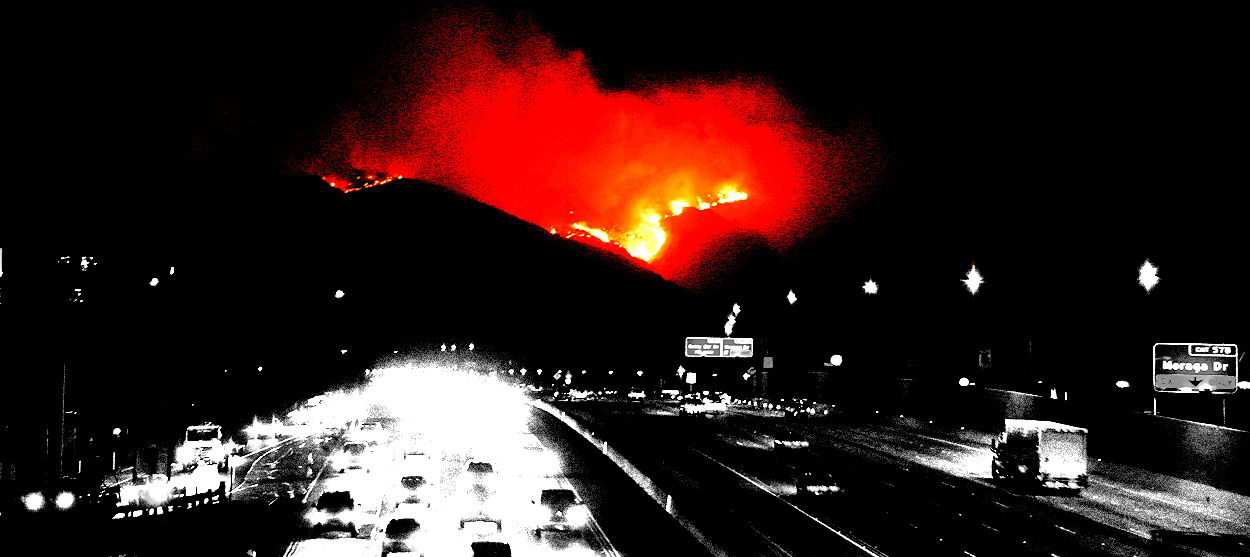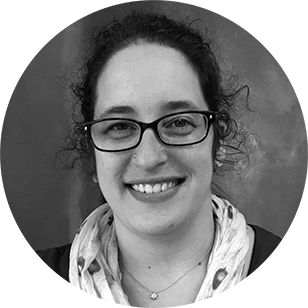Stop telling Californians to leave
For all of us who call this complicated, beautiful place home, there is no outrunning climate change


A free daily email with the biggest news stories of the day – and the best features from TheWeek.com
You are now subscribed
Your newsletter sign-up was successful
It's autumn in California, and it feels like we're living in a disaster film.
For the third straight year, monstrous wildfires have swept across the state, wiping out entire towns, displacing and threatening the lives of hundreds of thousands of residents. People in wealthy, manicured suburbs walk down the street wearing respirator masks, coughing through thick layers of smoke. Households huddle in the dark for days on end, lighting candles and hoarding supplies, because the power grid has been shut off — again.
In California, fire has always had a season. This has been true since I was a child growing up here, and long before. But now, as the winds die down and firefighters gain the upper hand on the latest round of catastrophic blazes, the line between "season" and "climate" is irreparably blurred. Thanks to decades of utility corruption and mismanagement, urban sprawl and stratification, California's landscape has turned into kindling. Climate catastrophe is upon us. And it's only going to get worse.
The Week
Escape your echo chamber. Get the facts behind the news, plus analysis from multiple perspectives.

Sign up for The Week's Free Newsletters
From our morning news briefing to a weekly Good News Newsletter, get the best of The Week delivered directly to your inbox.
From our morning news briefing to a weekly Good News Newsletter, get the best of The Week delivered directly to your inbox.
As my friends and loved ones commiserate, we've also been swapping stories. And one anecdote that seems to come up, again and again, is a certain type of reaction from people outside the state: "Why don't you all just leave?" "Come to the Midwest — there are no wildfires here!" "Get out and let the [expletive] burn."
It's a tempting response, a cheap joke. But it exposes a nasty assumption at the base of America's attitude towards climate change: that it's someone else's problem. That the people most directly affected are suckers for staying put. That if we were really smart, we would all just pick up and move. But for all of us who call this complicated, beautiful place home, there is no outrunning climate change. To disavow California, its wildfires, and its people, is to comfort oneself with a fiction.
I understand why people outside California would think leaving might be the best option. To them, the idea of deciding to remain in a home that has turned against you must seem terrifying. There is certainly an undeniable arrogance to the California way of life — to, as Farhad Manjoo described it in The New York Times, "the myth of endless space, endless fuel, endless water, endless optimism, endless outward reach and endless free parking." And the seeds for this crisis were sown long ago; wildfire season has been growing longer and more violent for decades. How can Californians possible be surprised by their increasing scale and devastation?
But I hear something else, too, in those jokes: the quiet assumption that no one is really "from" California, and therefore it should be easy to leave our state behind. In a sense, this is true. For the vast majority of people who live here, California is borrowed land. The territory where I was born and raised was repeatedly, genocidally stolen from the Ohlone people on its way to becoming part of the 31st American state. And from there, California's land has been exploited into artificial abundance: a place where water is siphoned from rivers into deserts, where you can hop in your car and drive across vast distances on the spur of the moment, where electricity flows freely through power lines intermingled with trees.
A free daily email with the biggest news stories of the day – and the best features from TheWeek.com
Indeed, the California mythos is based on impermanence, fluidity, flight. This is where schemers come to make a quick fortune, where dreamers come to reinvent themselves. It's the glitz of Hollywood, the freewheeling slouch of San Francisco and Berkeley, the technological hum of Silicon Valley. It's a state of immigrants and transplants, many of whom don't look or behave in the ways we've been conditioned to expect of "real Americans."
But the history that has brought California to this point — a history of human pillage and environmental plunder, of wishful thinking and urban sprawl, of corporate greed and political complicity — is as American as apple pie. Our federal government, and the corporate interests that manipulate it, are doing their best to ensure that climate change wreaks havoc on everyone, no matter where you live. Already, other American regions are dealing with catastrophic hurricanes, deadly ice storms, more wildfires. These are harbingers, and their effects will only continue to spread.
California is home, a real home, for people of all kinds. My family has been in the United States for four generations, and in California for three. My spouse and I were each born and raised here. Our parents and siblings live here; our loved ones are buried here; we are building a new family here. We live alongside people whose ancestors have lived here for thousands of years, and people who arrived only recently. People who have crossed state lines, international borders, and even oceans to put down roots here.
We live here, whether or not we deserve to do so. This is our home. We are grieving for the place we thought we knew, and trying to come to grips with the violent and unpredictable environment in which we now find ourselves. The California fires, and the responses of the powers that be, are taking a real toll on real people: wildfire victims who have lost homes and loved ones, disabled and chronically ill people whose lives are at risk every time the power goes out. Even in my privileged bubble, my loved ones and I are coping with repeated illnesses from wildfire smoke, with losses of refrigerated food and medication, with grief and fear that threatens to overwhelm us.
As California burns hotter and longer, perhaps those of us with the greatest privilege and resources — those who can afford to start over somewhere else — will leave. But not everyone can, or will, abandon this place. And those of us who could, have perhaps the greatest responsibility to stay. To hold companies and lawmakers to account for the mess they've created. To push for a more sustainable way of living across the state. To shore up our communities and join forces with those who do not have the option to leave. To make our state as humane and livable as we can, for as long as we can.
The story of California is far from over. How it plays out is up to us.
Want more essential commentary and analysis like this delivered straight to your inbox? Sign up for The Week's "Today's best articles" newsletter here.
Zoe Fenson is a freelance writer based in the San Francisco Bay Area. Her writing has appeared in Longreads, Narratively, The New Republic, and elsewhere. When she's not writing, you'll find her doing crossword puzzles in cocktail bars or playing fetch with her cat.
-
 5 cinematic cartoons about Bezos betting big on 'Melania'
5 cinematic cartoons about Bezos betting big on 'Melania'Cartoons Artists take on a girlboss, a fetching newspaper, and more
-
 The fall of the generals: China’s military purge
The fall of the generals: China’s military purgeIn the Spotlight Xi Jinping’s extraordinary removal of senior general proves that no-one is safe from anti-corruption drive that has investigated millions
-
 Why the Gorton and Denton by-election is a ‘Frankenstein’s monster’
Why the Gorton and Denton by-election is a ‘Frankenstein’s monster’Talking Point Reform and the Greens have the Labour seat in their sights, but the constituency’s complex demographics make messaging tricky
